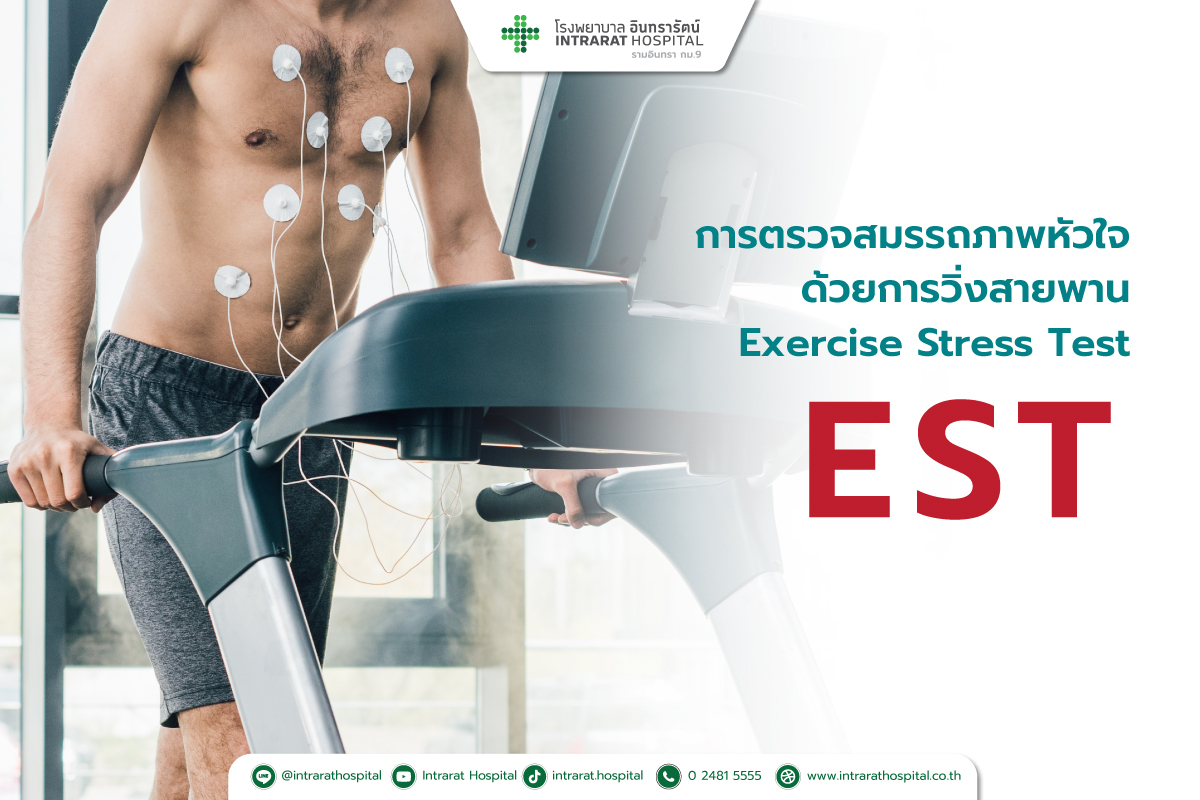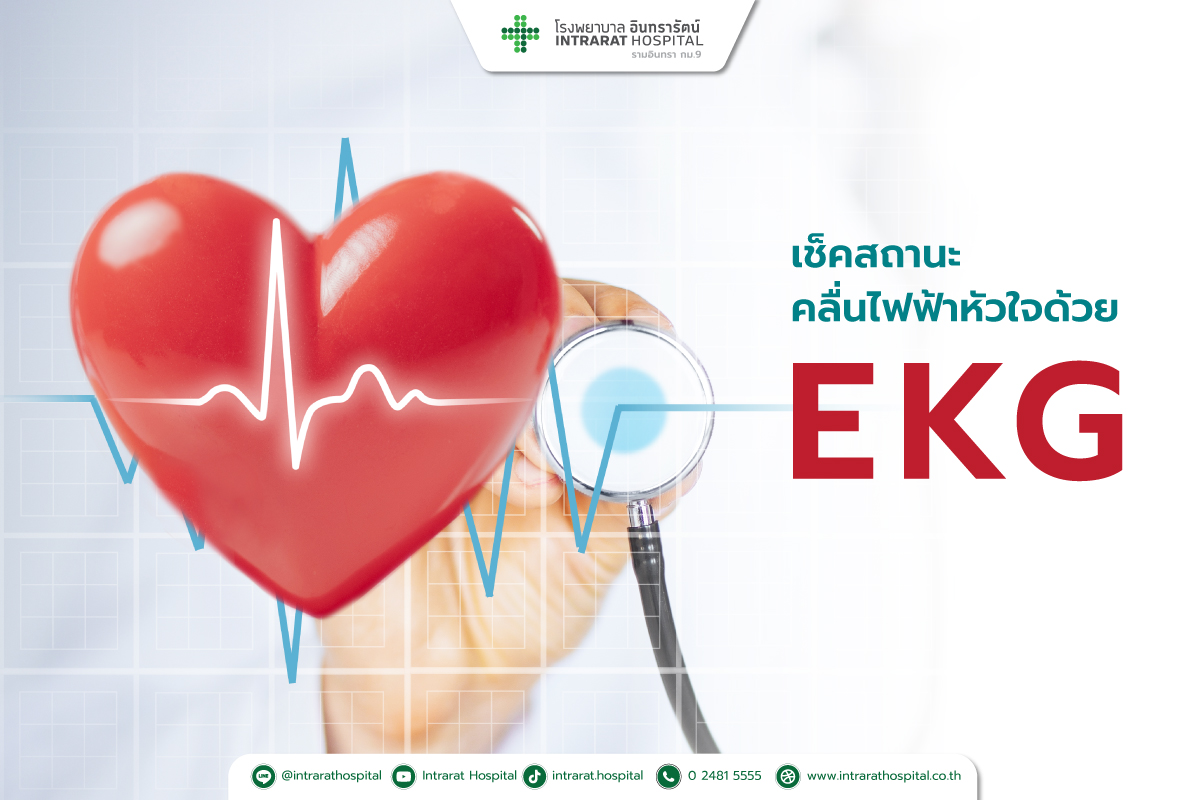Home Clinic Heart Center at Intrarat Hospital

Heart Center at Intrarat Hospital
Causes of Heart Disease
There are many causes of heart disease that are common in Thailand. The causes include coronary artery disease, cardiac arrhythmia, cardiac hypertrophy, low cardiac output and heart failure. Two major causes are genetic factors and lifestyle factors, including the consumption of foods that cause patients to have unhealthy blood cholesterol levels. Cholesterol deposits can lead to the buildup of plaque in the wall of the arteries that supply blood to the heart (called coronary arteries) over time.
Coronary Artery Disease
Coronary artery disease can be mainly divided into 2 groups. The first group is caused by plaque rupture in the coronary arteries causing blood clot and blockage. This causes the heart muscle to receive insufficient blood supply and oxygen, causing symptoms such as tightness or crushing pain in the mid-chest that may spread to other areas in upper body and sweating. This is a life-threatening condition that requires immediate intervention. Treatments include medications and intervention to open up a blocked artery at the hospital. The second group is caused by gradual plaque buildup in the wall of the coronary arteries, causing the inside of the arteries to narrow over time. Symptoms may include shortness of breath, sweating and episodes of chest pain, especially during physical exertion. It is vital to contact health care specialist to set up a complete heart evaluation, to treat and to prevent further complications.
Cardiac Arrhythmia
An arrhythmia is an irregular or abnormal heartbeat. Generally, cardiac arrhythmia can be classified by where they originate: Arrhythmia that begin in the Atria (the heart’s upper chambers) and Arrhythmia that begin in the Ventricles (the heart’s lower chambers). Some arrhythmia can cause blood clotting within the heart and increase the risk of embolic stroke. Therefore, it is vital that these patients receive anticoagulant medication and/or anti-platelet drug to reduce the risk of clotting. Generally, the symptoms of arrhythmia may include shortness of breath, heart palpitation, dizziness, feeling lightheaded and fainting. Some of the symptoms may be temporary. Hence, it is vital to see cardiologist to perform a variety of diagnostic tests to help confirm the presence of an arrhythmia and indicate its causes.
Congenital Heart Disease
Congenital heart disease is a defect in the structure of the heart or great vessels that is present since birth. Signs and symptoms are related to type and severity of the heart defect. Some symptoms may be noticeable early in life; however, it is possible that some symptoms may present later on in life. Some patients may have no signs while others may exhibit shortness of breath, cyanosis, fainting or heart murmur. Surgery or catheter procedure may be required for certain types of congenital heart disease. It is important to see a cardiologist after detecting abnormalities to prevent and / or treat complications.
Heart Failure
Heart failure is a condition in which the heart is unable to pump enough blood to meet the body’s need for blood supply and oxygen. Common causes of heart failure include coronary artery disease, valvular heart disease, genetic disease, excessive alcohol consumption and infection. Symptoms typically include shortness of breath, excessive fatigue, and leg swelling. Managing heart failure involve treating the underlying cause and may include lifestyle changes, medications or devices and surgical procedures. With modern technology and medications, people with heart failure condition can be able to have optimal quality of life.
Cardiogenetic Disease
Certain heart diseases, such as cardiomyopathy and Brugada Syndrome, can have a hereditary cause, many of which are usually present during adulthood. Certain lab investigation, including genetic testing can help in management decisions and preventive screening options for people at risk.
Structural Heart Disease
Structural heart disease is a broad term to describe issue with the structure of the heart, including heart valve disease, cardiac tumor, pericardial disease and pericardial effusion. These problems can interrupt normal blood flow from the heart to the body, leading to excessive fatigue and fainting. Treatment depends on the cause, ranging from medications to surgery. Structural heart disease should be evaluated by cardiologist to perform certain investigations to help diagnosis and treat the disease effectively.
Heart Disease Prevention
Nowadays, the goal for heart disease is to focus on early prevention. There are several ways to reduce the risk of developing heart disease, including living a healthy lifestyle, controlling blood pressure and cholesterol / Triglyceride levels. Eating a healthy, balanced diet and quitting cigarette smoking will also lower the risk for developing heart disease. There are many modern technologies with high accuracy that can help screen, diagnosis and predict prognosis for heart diseases, including Echocardiogram, Exercise stress test (EST), Holter monitoring, CT calcium score and CT coronary angiography.
Specialist doctor
Article
Exercise Stress Test (EST)
Testing your heart's fitness while exercising: EST (Exercise Stress Test) is an electrocardiogram while working hard.
- More
- 27/05/2567 09:10:46
Electrocardiography
Heart disease screening using an electrocardiogram is a preliminary test to detect any abnormalities that may occur or have occurred.
- More
- 27/05/2567 09:04:59
Echocardiogram (Echo)
An echocardiogram is a test to assess the efficiency of the heart's function.
- More
- 24/05/2567 15:36:36
Copyright @ 2021. All Rights Reserved By Intrarat Hospital



